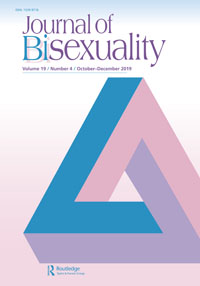
Coming out of the closet, often shortened to coming out, is a metaphor used to describe LGBTQ people's self-disclosure of their sexual orientation, romantic orientation, or gender identity.

Biphobia is aversion toward bisexuality or people who are identified or perceived as being bisexual. Similarly to homophobia, it refers to hatred and prejudice specifically against those identified or perceived as being in the bisexual community. It can take the form of denial that bisexuality is a genuine sexual orientation, or of negative stereotypes about people who are bisexual. Other forms of biphobia include bisexual erasure.

The field of psychology has extensively studied homosexuality as a human sexual orientation. The American Psychiatric Association listed homosexuality in the DSM-I in 1952 as a "sociopathic personality disturbance," but that classification came under scrutiny in research funded by the National Institute of Mental Health. That research and subsequent studies consistently failed to produce any empirical or scientific basis for regarding homosexuality as anything other than a natural and normal sexual orientation that is a healthy and positive expression of human sexuality. As a result of this scientific research, the American Psychiatric Association removed homosexuality from the DSM-II in 1973. Upon a thorough review of the scientific data, the American Psychological Association followed in 1975 and also called on all mental health professionals to take the lead in "removing the stigma of mental illness that has long been associated" with homosexuality. In 1993, the National Association of Social Workers adopted the same position as the American Psychiatric Association and the American Psychological Association, in recognition of scientific evidence. The World Health Organization, which listed homosexuality in the ICD-9 in 1977, removed homosexuality from the ICD-10 which was endorsed by the 43rd World Health Assembly on 17 May 1990.
Lesbian, gay, bisexual, transgender, and queer (LGBTQ) personnel are able to serve in the armed forces of some countries around the world: the vast majority of industrialized, Western countries including some South American countries, such as Argentina, Brazil and Chile in addition to other countries, such as the United States, Canada, Japan, Australia, Mexico, France, Finland, Denmark and Israel. The rights concerning intersex people are more vague.

Danish lesbian, gay, bisexual, and transgender (LGBT) rights are some of the most extensive in the world. In 2023, ILGA-Europe ranked Denmark as the third most LGBT-supportive country in Europe. Polls consistently show that same-sex marriage support is nearly universal amongst the Danish population.

Homophobia encompasses a range of negative attitudes and feelings toward homosexuality or people who identify or are perceived as being lesbian, gay or bisexual. It has been defined as contempt, prejudice, aversion, hatred, or antipathy, may be based on irrational fear and may sometimes be attributed to religious beliefs.

Homosexuality is sexual attraction, romantic attraction, or sexual behavior between members of the same sex or gender. As a sexual orientation, homosexuality is "an enduring pattern of emotional, romantic, and/or sexual attractions" exclusively to people of the same sex or gender. It "also refers to a person's sense of identity based on those attractions, related behaviors, and membership in a community of others who share those attractions."

The Journal of Bisexuality is a peer-reviewed academic journal published quarterly by the Taylor & Francis Group under the Routledge imprint. It is the official journal of the American Institute of Bisexuality. It covers a wide range of topics on bisexuality including new bisexuality research, bisexual issues in therapy, differences from the straight, lesbian and gay communities, growth of the bisexual movement, bisexuality and the media, bisexual history, and different bisexual lifestyles.

GLQ: A Journal of Lesbian and Gay Studies is a scholarly, peer-reviewed journal based published by Duke University Press. It was co-founded by David M. Halperin and Carolyn Dinshaw in the early 1990s. In its mission, the journal seeks "to offer queer perspectives on all issues touching on sex and sexuality." It covers religion, science studies, politics, law, and literary studies.

The Association of LGBTQ Psychiatrists, originally the Association of Gay and Lesbian Psychiatrists (AGLP), is an organization that educates and advocates on lesbian, gay, bisexual, and transgender (LGBTQ) mental health issues.
Jack Drescher is an American psychiatrist and psychoanalyst known for his work on sexual orientation and gender identity.

Timeline of events related to sexual orientation and medicine
Various issues in medicine relate to lesbian, gay, bisexual, and transgender people. According to the US Gay and Lesbian Medical Association (GLMA), besides HIV/AIDS, issues related to LGBT health include breast and cervical cancer, hepatitis, mental health, substance use disorders, alcohol use, tobacco use, depression, access to care for transgender persons, issues surrounding marriage and family recognition, conversion therapy, refusal clause legislation, and laws that are intended to "immunize health care professionals from liability for discriminating against persons of whom they disapprove."
Research has found that attempted suicide rates and suicidal ideation among lesbian, gay, bisexual, and transgender (LGBTQ) youth are significantly higher than among the general population.
Ilan H. Meyer is an American psychiatric epidemiologist, author, professor, and a senior scholar for public policy and sexual orientation law at the Williams Institute of UCLA. He has conducted extensive research on minority identities related to sexual orientation, gender, race and ethnicity, drawing conclusions on the impact of social stresses on their mental health. Meyer was an expert witness for the plaintiffs in Perry v. Schwarzenegger (2010), the federal case that overturned California Proposition 8.
Arlene Istar Lev is a North American clinical social worker, family therapist, and educator. She is an independent scholar, who has lectured internationally on topics related to sexual orientation and gender identity, sexuality, and LGBTQ families.
Research shows that a disproportionate number of homeless youth in the United States identify as lesbian, gay, bisexual or transgender, or LGBT. Researchers suggest that this is primarily a result of hostility or abuse from the young people's families leading to eviction or running away. In addition, LGBT youth are often at greater risk for certain dangers while homeless, including being the victims of crime, risky sexual behavior, substance use disorders, and mental health concerns.

The African-American LGBT community, otherwise referred to as the Black American LGBT community, is part of the overall LGBTQ culture and overall African-American culture. The initialism LGBT stands for lesbian, gay, bisexual, and transgender.
LGBTQ psychology is a field of psychology of surrounding the lives of LGBTQ+ individuals, in the particular the diverse range of psychological perspectives and experiences of these individuals. It covers different aspects such as identity development including the coming out process, parenting and family practices and support for LGBTQ+ individuals, as well as issues of prejudice and discrimination involving the LGBTQ community.
Robert Piotr Cabaj was an American psychiatrist, scholar and author, known for his extensive publications on LGBT mental health, including editing one of the early and influential textbooks in the field. He served as president of the Association of Gay and Lesbian Psychiatrists (AGLP) and of the Gay and Lesbian Medical Association.









